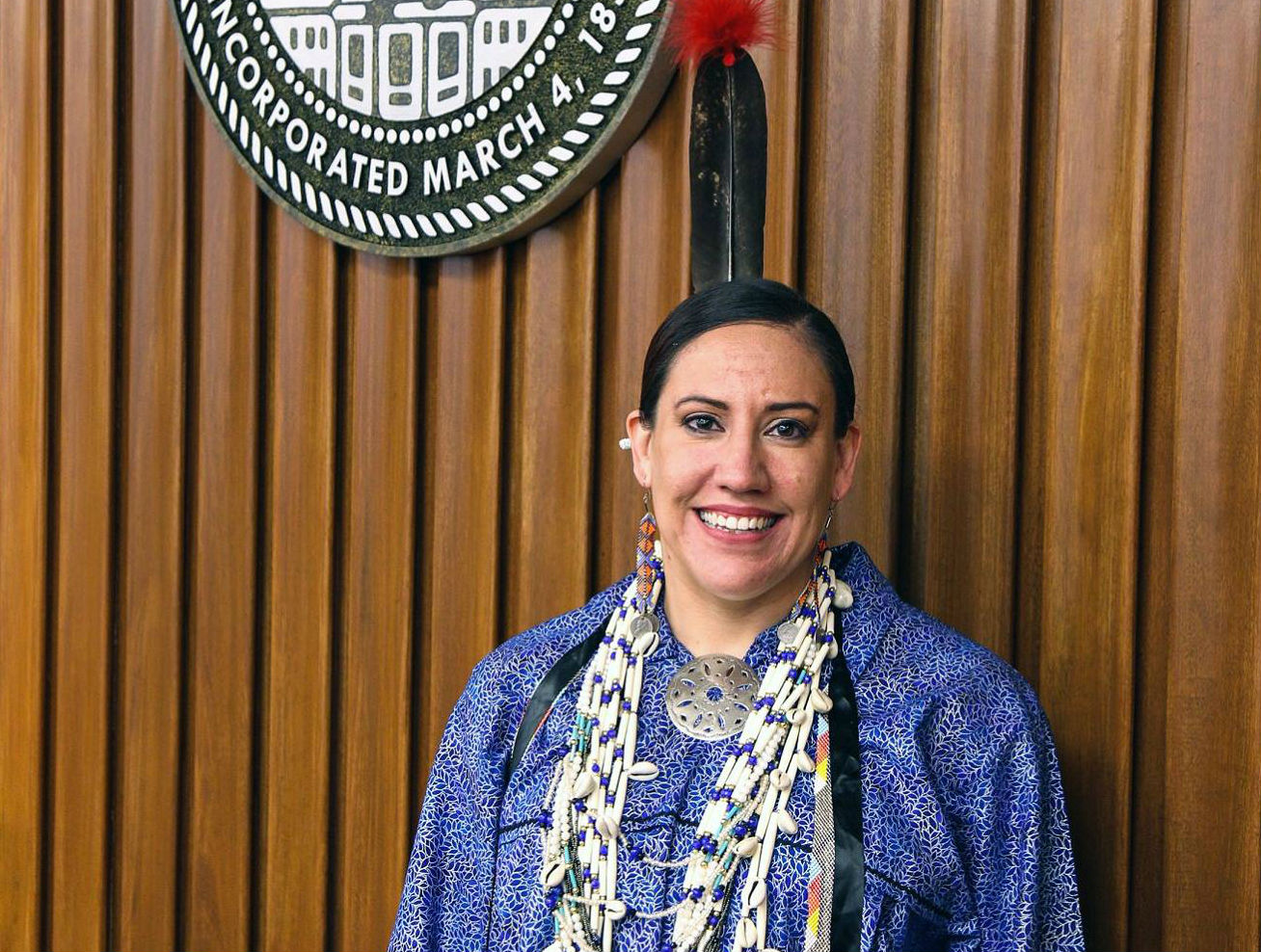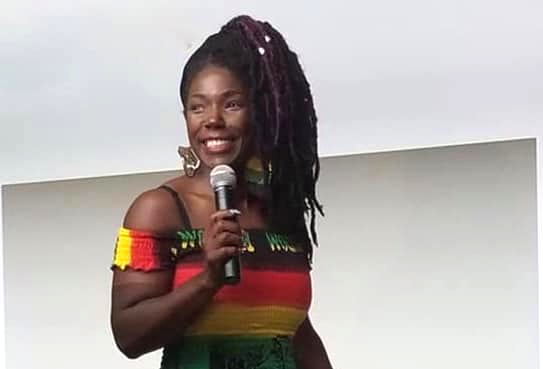Longtime community activist and leader Brandi Grayson, who is running to represent Madison’s South Side on the Common Council, has clarified comments she made on social media that have drawn backlash from Indigenous communities.
The controversy began last week Tuesday, when local activist Yeshua Nytr asked in a Facebook post “who built the pyramids in East St. Louis with the African symbols,” referring to the Cahokia historical site. Grayson responded, “It was Blk natives.”
After being questioned and challenged by a white woman in Facebook comments, Grayson made a Facebook Live video expressing the problematic nature of white “allies” policing the speech of Black and brown people.
She also expressed the controversial view that Black people “are the original inhabitants of the land known as America.”
“I said to her, ‘You know that the history of people known as black isn’t either-or. It’s not either you’re red or you’re black,’” Grayson said in the live video. “That’s not even how this works. There’s this melting pot and things that take place in our genes and our genetics … It’s like this emotional response that occurs in not just white people, but in other people when Black people say, ‘Actually our history goes back thousands of years. Actually we are the original inhabitants of the land known as America and in a lot of countries across the globe.’”
Several Indigenous people took issue with the term “red.”
“It’s not our preferred descriptor,” said Madison Alder Arvina Martin, who is a member of the Ho-Chunk Nation and who has endorsed Grayson in her campaign for Common Council.
“It’s a slur. It’s something that Native folks will use amongst themselves, and it’s not terminology that is meant to be used by people who are not Native,” said another Indigenous person, who asked to remain anonymous for fear of retaliation.

Several Indigenous people also told Madison365 they felt Grayson’s comments about their history amounted to “erasure” of their identity and history.
“Recently … she has been saying that basically anything of value that was created in Turtle Island (an Indigenous term for North America), whether that’s Cahokia, whether that’s mound systems, whether that’s the Mesoamerican pyramids, was actually created first by Black people. And Black people are the original Indigenous people to the Americas, to what we call Turtle Island, and that we essentially came later, which completely disregards hundreds of different nations’ origin stories and our own understanding of our histories as we were the original ones here,” said one Indigenous person who wished to remain anonymous.
“We want to be able to tell our own stories, to describe ourselves, and identify ourselves as the way we see it and as the way we always have,” said Martin, who said she had a respectful conversation with Grayson late last week about the comments. “I think that’s a simple respect that we are requesting, to be identified in the way we wish to be identified, the way we’ve always identified ourselves.”
Grayson said that’s all she’s doing as well.
“People come to the conversation with their historians, their anthropologists, their storytellers,” she said. “And then when people known as Black come to the table with their storytellers, when we go research our stories, and we backdate our time, and with this place called America, that’s over 100,000 years, then there’s some pushback and this idea that we’re erasing someone else’s history. We tell our story. And it wasn’t my intent to erase Native American history. It’s not like when they tell their story, they tell the story of their connection to Africans. And nor do we demand it, or get upset when they don’t.”
Controversial beliefs
In her Facebook comments last week and interview Monday, Grayson expressed adherence to an Afrocentric belief that Black Africans migrated to the Americas 50,000 to 100,000 years ago.
“The people that’s known as native Americans and Indigenous folk are descendants from people known as African, AKA Black people, just like the rest of the world,” she said. “That’s what I meant, that you can find African traditions, African symbols, African dance, African feathers, African skirts, African culture … you can see it in Indigenous culture. And that is a telltale sign that there’s an intersection and a connection between the people known as Africans and those known as indigenous people.”
She cited books like They Came Before Columbus, written by Ivan Van Sertima in 1976, and The First Americans Were Africans, published in 2011 by David Imhotep, who claims to be the first person to earn a PhD in ancient African history. Van Sertima, Imhotep and others cite evidence like early drawings of Native Americans with dark skin, references in early European explorers’ journals to Natives with “blue-black skin” and African symbols on or near Indigenous sites.
Almost all mainstream historians and anthropologists reject these claims.
“Archaeological, linguistic, and genetic lines of evidence all indicate that the first peoples entered the Americas by 14,600 years ago and probably no earlier than 16,000 years ago,” UW-Madison anthropologist Sissel Schroeder said in an email to Madison365. “Any archaeological evidence for an earlier presence of people in the Americas is ambiguous and highly contested by scientists.”
Most anthropologists agree that an area known as Beringia, between modern Siberia and Alaska, was habitable dry land for as many as 5,000 years during a major ice age. Based on genetic data, they speculate that as the ice age ended and the ocean encroached about 15,000 years ago, some inhabitants of the area migrated eastward back into Asia, and some migrated into North America, becoming the progenitors of Native Americans.
Anthropologist and director of the American Indian Studies Program at UW-Madison Larry Nesper said it is possible that some Africans arrived in the Western Hemisphere before Columbus.
“As far as I know, Black Africans first arrived with the slave trade, though I have heard people speculate that Africans may have made their way to Central America before Columbus, but certainly not before Native Americans,” Nesper wrote in an email to Madison365.
Virtually no one disputes that African Americans intermingled with Native Americans after Europeans arrived with enslaved Africans, or that some Indigenous nations even enslaved African Americans.
Grayson also said regardless of history, she identifies anyone with dark skin tone as “Black.”
“Even Africans that you see, the police don’t ask them if they’re from Africa, they treat you as a Black person. That’s how we identify people known as Black, by their color, not their language or nationality,” she said. “If you’re saying to me that maybe those people wasn’t Black, they were just dark, then what are you really saying to me? Then we’re redefining Black. I’m saying it don’t matter because dark hue means melanated. Everybody that got melanin are descendants of Africans. You can’t get around it.”
However, one of the Indigenous people who spoke with Madison365 said phenotypes — physical characteristics — are not as important to Indigenous identity.
“When we go back to the understanding of who is Native and how we accept each other, there’s an understanding that you can have someone that looks straight up plains level indigenous Hollywood Indian, and you can have someone in the same family, blonde hair, blue-eyed and understand as Native people that both of those people are equally Native,” she said.
Thus Black African Americans who became members of Indigenous tribes or families would be considered Indigenous — but also could be considered Black.
“Erasure”
Indigenous people said attributing their traditions and accomplishments to African origins amounted to “erasure” of their history.
“Taking our best parts and claiming that they’re yours is certainly a form of erasure, and certainly a form of its own supremacy,” said one Indigenous person who asked to remain anonymous.
“It’s very hard for people to access accurate Indigenous histories, and for her to be very publicly stating that all of our achievements are in fact not our own, it’s incredibly demeaning,” said another Indienous person. “It basically suggests that we are not intelligent enough, we are not capable enough to create good things, which is very much co-opting the language of white supremacy. We already get told that by other groups, and to hear this coming again from this different perspective is also hard.”
“This isn’t the only group that has said that we are really something else,” Martin said. “There are people that say, ‘Oh, you guys are really Europeans because the Vikings came.’ We don’t like that. ‘You guys are really Asian because of the Bering Strait theory.’ We don’t think that either. ‘You guys are part of the 12 lost tribes of Israel.'”
The Indigenous people who spoke with Madison365 said they have heard these sentiments before but it’s different coming from a well-known and respected community leader who’s running for office.
“I would say there’s a really big difference between running into this sort of sentiment on random forums on the internet and running into it with someone who has a lot of support and power and in a lot of ways in the community,” said one. “She’s running for office and she is really involved in a lot of the activism work around here. So it is different just because she has the power and platform to kind of back up what she’s saying.”
“She has a lot of followers who are white who look to her for her racial guidance. She has curated a very strong following,” said another.
Grayson said she doesn’t intend to dismiss or erase Indigenous history.
“Now we’re in a place of getting into discovery of how we learn together and grow. But it’s not erasing their history,” Grayson said. “I’m often referring to indigenous people as the most vulnerable, more than Black people, because we don’t even include their statistics in our conversations. But I often include their statistics in our conversation, that they actually have a higher suicide rate, higher infant mortality rate.”
She also insists that she has never said or implied that Indigenous people are not people of color, despite rumors circulating that she has.
She said she doesn’t feel the need to apologize for what she did say, but understands where the Indigenous people are coming from.
“I can’t apologize for talking about facts because I mean, I didn’t say anything wrong,” she said. “I would just acknowledge how my conversation would occur to people that may not be coming from the same frame of reference.”
Coming together
Martin said she and Grayson had a constructive conversation, and even exchanged book recommendations.
“She … certainly challenged me to look at any kind of subconscious anti-Black bias that I might have, which I think is important because in this culture, we’re all subjected to it,” Martin said. “And so I certainly take that kind of self reflection seriously … and I tried to explain about what our stories tell us about how we came to be and how that, because these are coming from an oral tradition and are not written down, doesn’t make them less valid. … I certainly don’t want to be tone policing anybody, but I do think that when we have conversations in a public square … if we want to be understood by others who are not necessarily part of the group that we are specifically talking to, we may have to look at how we use our words.”
“This is the beginning of how we build collaboration and true partnerships between groups, getting into discovery of each other’s history and our story and being open to the conversation and the dialogue,” Grayson said.
Martin is still listed among Grayson’s many endorsements. Reached Tuesday afternoon, Grayson’s opponent, Common Council President Sheri Carter, declined to comment.




























